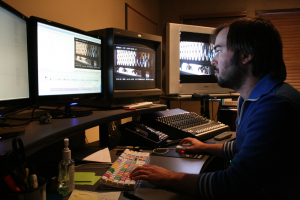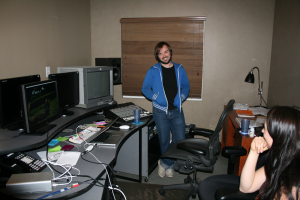The American Cinema Editors (ACE) hosted their 9th annual "Invisible Art, Visible Artists" series, where all five of the Academy Award Nominated Editors meet on stage at the Egyptian Theater to discuss their craft. What an absolute treat. Editing is alchemy. And almost by definition, the best editing is invisible. Or to put it differently, if you notice the editing in a movie, then the editor is probably doing a poor job.
It follows that good editing is one of the above-the-line arts that rarely receives the credit it is due (casting director is, I think, the only above-the-line credit that still does not receive an Academy Award).
Jay and I arrived on Hollywood Boulevard at 8:30am...

We trekked past the security fences, past all the press tents (below) set up for the Academy Awards...

And we arrived at the historic Egyptian Theater, replete with Egyptian fonts, phallic pillars, and a Spanish tiled roof.

This year's editing nominees spoke for several hours, showing clips of their movies and discussing how they constructed the scenes. The editors were:
*Kirk Baxter and Angus Wall for The Curious Case of Benjamin Button.
*Chris Dickens for Slumdog Millionaire
*Lee Smith for The Dark Knight
*Mike Hill and Dan Hanley for Frost/Nixon
*Elliot Graham for Milk
Discussing their process, nearly all the editors seemed to start with a first cut of their movie that was three or four hours long, and then chisel away material from there. The gift of editing an academy award nominated movie is the plethora of good material and great performances to choose from. On an independent level, it often feels like the editor's job is to cut around poor performances, bad footage, or to make sense of an incoherent story. All of the editors who spoke today had the opposite problem; when you have Josh Brolin and Sean Penn both giving great performances in a scene (Milk), how do you decide which actor to cut away from? When you have reels of gorgeous material, how do you decide what to leave out?
These are good problems to have.

If you TiVo the Academy Awards tomorrow, please don't fast forward when the editors receive their awards. They have one of the most painstaking and difficult tasks in the film making process. Editing is often a thankless task: audiences don't notice when you do a good job, they only notice when you screw up. Yet the editor is truly the last writer of the film, often constructing a narrative or finding solutions that can rescue a troubled film, or make a good film great.









